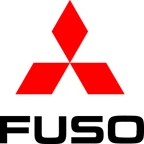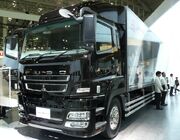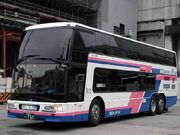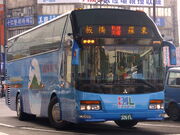 | |
| Type | subsidiary of Daimler AG |
|---|---|
| Founded | January 6, 2003 |
| Headquarters | 890-12, Kashimada, Saiwai-ku, Kawasaki-shi, Kanagawa, 212-0058 Japan |
| Key people |
Keisuke Egashira (Chairman); Albert Kirchmann (President, CEO); Heki Kasugai (EVP) |
| Industry | Automobile manufacturing |
| Products | Buses and Trucks |
| Revenue (turnover) | €30.368 billion (2005) |
| Employees | (Consolidated) c.18,200 |
| Parent | Daimler AG |
| Website |
http://www.fuso-trucks.com/ http://www.mitsubishi-fuso.com/en/index.html |
The Mitsubishi Fuso Truck and Bus Corporation is a German-owned, Japanbased manufacturer of trucks and buses. It is headquartered in Kawasaki, Kanagawa, Japan. This company is one of the World's largest truck manufacturers. Daimler AG of Germany owns approximately 85% of Mitsubishi Fuso and Mitsubishi Fuso is a member of the Daimler Trucks division of Daimler AG [1]. The other 15% is owned by Mitsubishi of Japan.
The name Fuso translates to hibiscus, an ancient name for Japan used by the Chinese and this was the name for the company's first product in 1932.
History
- 1932: First B46 bus built and christened "Fuso" at Mitsubishi Shipbuilding Co., Ltd.'s Kobe Works.
- 1934: Mitsubishi Shipbuilding Co., Ltd. renamed Mitsubishi Heavy Industries Co., Ltd.
- 1937: MHI motor vehicle operations at Kobe Works transferred to Tokyo Works.
- 1949: Fuso Motors Sales Co., Ltd. established. (Renamed Mitsubishi Fuso Motors Sales Co., Ltd. in 1952)
- 1950: Mitsubishi Heavy Industries is split into three companies: East Japan Heavy Industries, Ltd., Central Japan Heavy Industries, Ltd. and West Japan Heavy Industries, Ltd.
- 1952: Central Japan Heavy Industries, Ltd. renamed Shin Mitsubishi Heavy Industries, Ltd.; West Japan Heavy Industries, Ltd. renamed Mitsubishi Shipbuilding and Engineering Co., Ltd., East Japan Heavy Industries, Ltd. renamed Mitsubishi Nippon Heavy Industries, Ltd.
- 1957: MNHI integrates Tokyo and Kawasaki Works into the Tokyo Motor Vehicle Works.
- 1964: Mitsubishi Nippon Heavy Industries, Ltd., Shin Mitsubishi Heavy Industries, Ltd. and Mitsubishi Shipbuilding and Engineering Co., Ltd. merged to form Mitsubishi Heavy Industries, Ltd. Mitsubishi Fuso Motors and Shin Mitsubishi Motors Sales Co. merge to form Mitsubishi Motors Sales Co.
- 1970: MHI signs joint venture agreement with Chrysler Corporation. Mitsubishi Motors Corporation (MMC) established. MHI transfers motor vehicle operations to MMC.
- 1975: MMC commissions Nakatsu Plant at its Tokyo Motor Vehicle Works.
- 1980: MMC commissions Kitsuregawa Proving Grounds.
- 1982: Fuso brand celebrates 50th anniversary.
- 1984: MMC merges with Mitsubishi Motor Sales Co., Ltd.
- 1985: MMC and Mitsubishi Corporation establish joint-equity company Mitsubishi Truck of America, Inc. in the United States.
- 1993: MMC and Chrysler Corporation dissolve equity partnership.
- 1999: MMC and AB Volvo enter equity and operational alliance covering truck and bus operations. AB Volvo acquires 5% of MMC stock.
- 2001: DaimlerChrysler replaces AB Volvo as MMC's strategic alliance partner in the truck and bus sector. MMC renames Tokyo Plant the Truck and Bus Production Office (referred to externally as the Kawasaki Plant).
- 2003: Mitsubishi Fuso Truck and Bus Corporation established. DaimlerChrysler, Mitsubishi Motors Corporation and other Mitsubishi group companies acquire equity stakes of 43%, 42% and 15% respectively in MFTBC.
- 2004: Daimler AG, Mitsubishi Motors Corporation and Mitsubishi group companies hold shares of 65%, 20% and 15% respectively as MMC sold part of its MFTBC shares to Daimler AG, then DaimlerChrysler.
- 2005: Mitsubishi Motors Corporation transferred rest of its MFTBC shares to DaimlerChrysler as a major part of the agreement of compensation for financial damages resulting from quality issues and recalls at MFTBC. Daimler AG, then DaimlerChrylser and Mitsubishi group companies hold shares of 85% and 15% respectively
- 2006: MFTBC relocated the headquarters from Tokyo to Kawasaki-shi, Kanagawa.
Daimler AG (85%), Mitsubishi group companies (15%)
Facilities
Fuso trucks are mostly developed and built in Japan. The facilities include:
- Kitsuregawa Proving Ground
- Kawasaki Plant and Research & Development Center
- Nakatsu Plant
- Oye Bus Plant
- Mitsubishi Fuso Bus Manufacturing Co., Ltd. in Fuchu-machi, Nei-gun, Toyama
The Canter is being manufactured by Mitsubishi Fuso in Tramagal/Portugal since 1980. Tramagal is located 150 km north of Lisbon. The factory achieves a production capacity of 15,000 units per year and shift with approximately 480 employees (status: April 2005). 100,000 vehicles have been produced to date. High production quality standards certified with ISO-standards, combined with a test track and extensive final inspection and quality checks lead to a tough and reliable truck –
The European Marketing & Sales Headquarter of Mitsubishi Fuso is located in Stuttgart, Germany.
Products

Fuso Super Great
Domestic Japan
Truck
- Canter
- Canter Guts (Canter Mini)
- Canter Eco Hybrid
- Fighter
- The Great
- Super Great
Bus

A Fuso Aero King is operated by Nishinihon JR Bus Co., in Japan.
- Rosa
- Aero Midi
- Fuao Aero Midi MK
- Fuso Aero Midi MJ
- Fuso Aero Midi ME
- Aero Star
- Aero Queen
- Aero King
- Aero Bus
- Aero Ace
- Mitsubishi Cruiser[2]
- Mitsubishi Eagle
Outside Japan
Truck

Fuso FK fire engine
- Fuso FB (Canter Mini)
- Fuso FC (Canter)
- Fuso FE (Canter) formerly also rebadged and sold as Sterling 360
- Fuso FG (Canter 4WD)
- Fuso FH (Canter Hi)
- Fuso FK (Fighter)
- Fuso FM (Fighter Hi)
- Fuso FL (Fighter 4WD)
- Fuso FP/FS/FV (Super Great/Heavy Duty)
- Fuso Shogun (Manufacture in New Zealand only)
Bus

A Fuso RM bus is operated by Kamalan Bus Inc. in Taiwan.
- Fuso Rosa
- Fuso MK (Aero Midi)
- Fuso MP (New Aero Star) non-step Diesel & CNG
- Fuso MS (Aero Bus/Aero Queen)
- Fuso BK125L (Bus chassis)
- Fuso BM115/116/117/118 (Bus chassis)
- Fuso RK (Bus chassis)
- Fuso RM (Bus chassis)
- Fuso RP (Bus Chassis)
- Fuso RP117NL (Philippine Market Bus chassis)
- Fuso RS113S / RS115S (Philippine Market Bus Chassis)
Others
- Truck Chassis
- Bus Chassis
- Industrial Engines
Transport electrification
The Mitsubishi Fuso Aero Star Eco Hybrid (diesel-electric bus) is now setting new standards in practical trials in Japan. It can reduce fuel consumption by as much as 30 percent [3]. The Mitsubishi Fuso Aero Star Eco Hybrid operates with a series hybrid drive, in which the diesel engine does not drive wheels directly but instead is used solely to drive an electrical generator to recharge lithium-ion batteries[4], connected to the two electric motor (with a combined output of 158 kW), which propel the vehicle [5].
Daimler Trucks uses such a system for most of its full-hybrid commercial vehicles, including in the Mitsubishi Fuso Canter Eco Hybrid, while series hybrids are reserved for urban buses, where they work most efficiently [6].
Global distribution
Outside of Japan Mitsubishi Fuso Truck and Bus Corporation are sold in:
- United States: Mitsubishi Fuso Truck of America, inc. (Logan, New Jersey)
- Canada: via a network of independent parts and distributors
- Latin America: via Mitsubishi Motors, Daimler and independent dealers
- Asia: via Mitsubishi Motors, Daimler and independent dealers
- Middle East: via Mitsubishi Motors and independent dealers
- Africa: via Mitsubishi and independent dealers
- Oceania: via Daimler/Mercedes-Benz, Mitsubishi Motors, Fuso and independent dealers
- Europe: via Mitsubishi Motors, Daimler/Mercedes-Benz and other independent dealers
References
- ↑ http://www.daimler.com/dccom/0-5-1096051-1-1099599-1-0-0-1096078-0-0-135-876574-0-0-0-0-0-0-0.html
- ↑ http://www.ghabbourauto.com/
- ↑ http://www.daimler.com/dccom/0-5-1096051-1-1096078-1-0-0-0-0-0-14972-876574-0-0-0-0-0-0-0.html
- ↑ http://www.daimler.com/dccom/0-5-1096051-1-1099603-1-0-0-1096078-0-0-135-876574-0-0-0-0-0-0-0.html
- ↑ http://www.daimler.com/dccom/0-5-1096051-1-1099599-1-0-0-1096078-0-0-135-876574-0-0-0-0-0-0-0.html
- ↑ http://www.daimler.com/dccom/0-5-1096051-1-1099603-1-0-0-1096078-0-0-135-876574-0-0-0-0-0-0-0.html
External links
| This page uses some content from Wikipedia. The original article was at Mitsubishi Fuso. The list of authors can be seen in the page history. As with Tractor & Construction Plant Wiki, the text of Wikipedia is available under the Creative Commons by Attribution License and/or GNU Free Documentation License. Please check page history for when the original article was copied to Wikia |
- FUSO Trucks
- Mitsubishi Fuso Japan
- Mitsubishi Fuso America
- Mitsubishi Fuso Europe
- Mitsubishi Fuso Australia
- Mitsubishi Fuso New Zealand
- Mitsubishi Fuso South Africa
- Mitsubishi Fuso Morocco
| ||||||||||||||||||||||||||||||||||||||||||||||||||||||||||||||||||||||||||||||
| |||||||||||||||||
| ||||||||
| ||||||||||||||||||||||||||||||||||||||||||||||||||||||||||||||||||